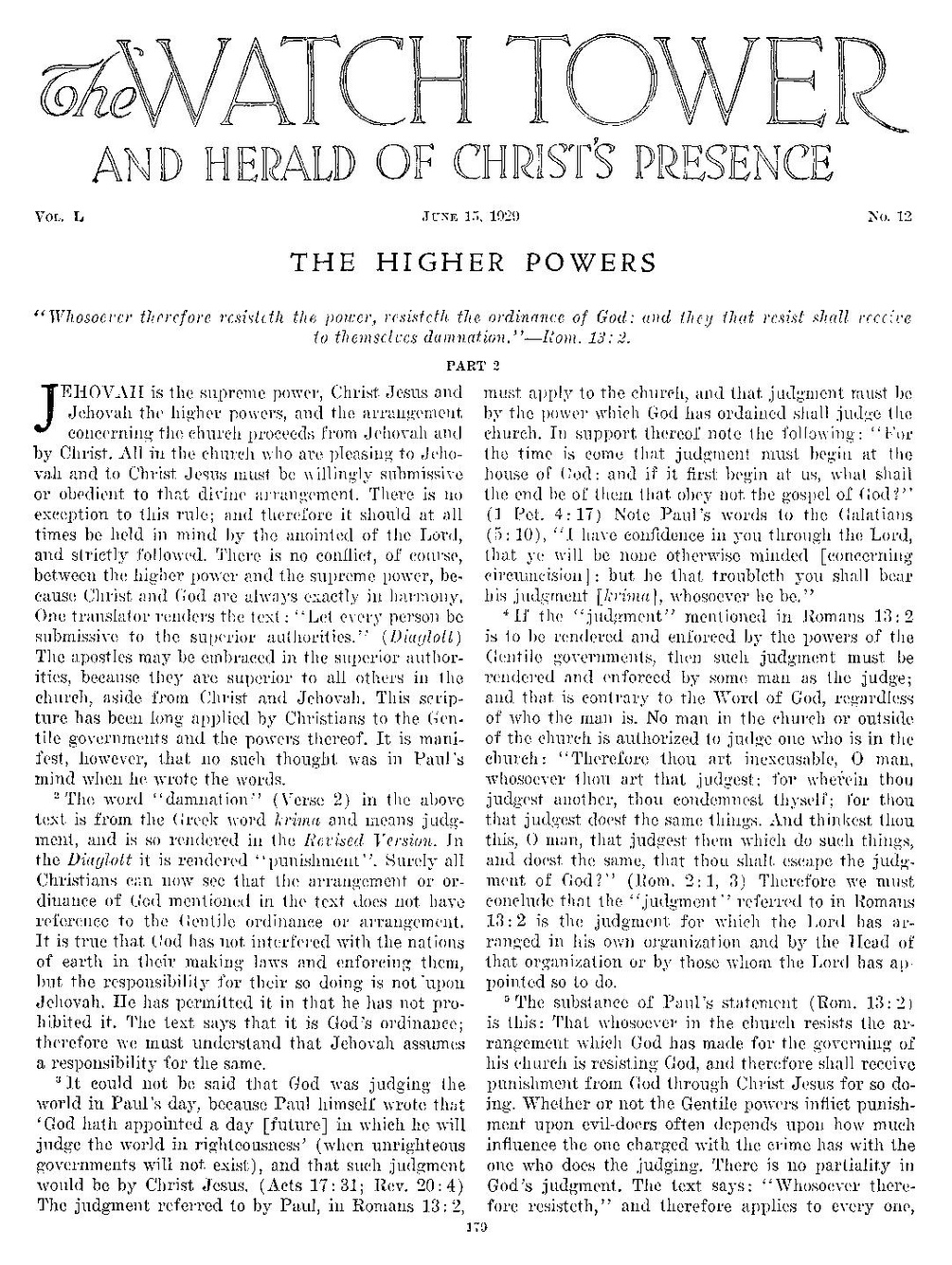The WATCH TOWER
AND HERALD OF CHRIST'S PRESENCE
Vol. L JUNE 15, 1929 No. 12
THE HIGHER POWERS
"Whosoever therefore resisteth the power, resisteth the ordinance of God: and they that resist shall receive to themselves damnation. - Rom. 13:2.
PART 2
JEHOVAH is the supreme power, Christ Jesus and Jehovah the higher powers, and the arrangement concerning the church proceeds from Jehovah and by Christ. All in the church who are pleasing to Jehovah and to Christ Jesus must be willingly submissive or obedient to that divine arrangement. There is no exception to this rule; and therefore it should at all times be held in mind by the anointed of the Lord, and strictly followed. There is no conflict, of course, between the higher power and the supreme power, because Christ and God are always exactly in harmony. One translator renders the text: "Let every person be submissive to the superior authorities." (Diaglott) The apostles may be embraced in the superior authorities, because they are superior to all others in the church, aside from Christ and Jehovah. This scripture has been long applied by Christians to the Gentile governments and the powers thereof. It is manifest, however, that no such thought was in Paul's mind when he wrote the words.
2 The word "damnation" (Verse 2) in the above text is from the Greek word krima and means judgment, and is so rendered in the Revised Version. In the Diaglott it is rendered "punishment". Surely all Christians can now see that the arrangement or ordinance of God mentioned in the text does not have reference to the Gentile ordinance or arrangement. It is true that God has not interfered with the nations of earth in their making laws and enforcing them, but the responsibility for their so doing is not upon Jehovah. He has permitted it in that he has not prohibited it. The text says that it is God's ordinance; therefore we must understand that Jehovah assumes a responsibility for the same.
3 It could not be said that God was judging the world in Paul's day, because Paul himself wrote that 'God hath appointed a day [future] in which he will judge the world in rightcousness' (when unrighteous governments will not exist), and that such judgment would be by Christ Jesus. (Acts 17:31; Rev. 20:4) The judgment reffered to by Paul, in Romans 13: 2, must apply to the church, and that judgment must be by the power which God has ordained shall judge the church. In support thereof note the following: "For the time is come that judgment must begin at the house of God: and if it first begin at us, what shall the end be of them that obey not the gospel of God?" (1 Pet. 4:17) Note Paul's words to the Galatians (5:10), "I have confidence in you through the Lord, that ye will be none otherwise minded [concerning circuncision]: but he that troubleth you shall bear his judgment [krima], whosoever he be."
4 If the "judgment" mentioned in Romans 13:2 is to be rendered and enforced by the powers of the Gentile governments, then such judgment must be rendered and enforced by some man as the judge; and that is contrary to the Word of God, regardless, of who the man is. No man in the church or outside of the church is authorized to judge one who is in the church: "Therefore thou art inexcusable, O man, whosoever thou art that judgest: for wherein thou judgest another, thou condemnest thyself; for thou that judgest doest the same things. And thinkest thou this, 0 man, that judgest them which do such things, and doest the same, that thou shalt escape the judgment of God?" (Rom. 2:1,3) Therefore we must conclude that the "judgment" reffered to in Romans 13:2 is the judgment for which the Lord has arranged in his own organization or by those whom the Lord has appointed so to do.
5 The substance of Paul's statement (Rom. 13:2) is this: That whosoever in the church resists the arrangement which God has made for the governing of his church is resisting God, and therefore shall receive punishment from God through Christ Jesus for so doing. Whether or not the Gentile powers inflict punishment upon evil-doers often depends upon how much influence the one charged with the crime has with the one who does the judging. There is no partiality in God's judgment. The text says: "Whosoever therefore resisteth," and therefore applies to every one,
